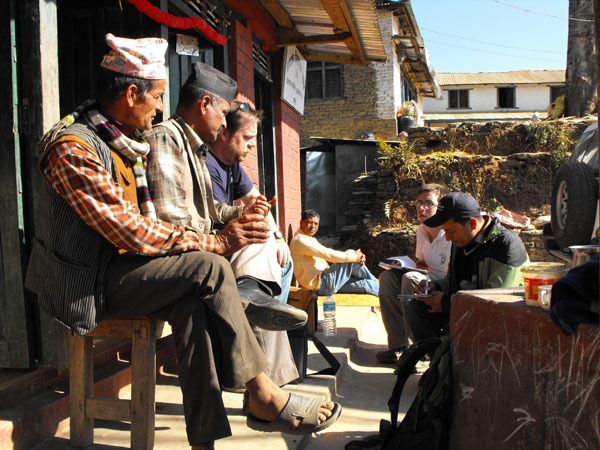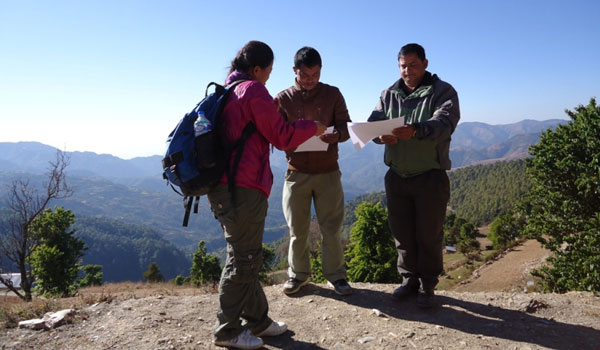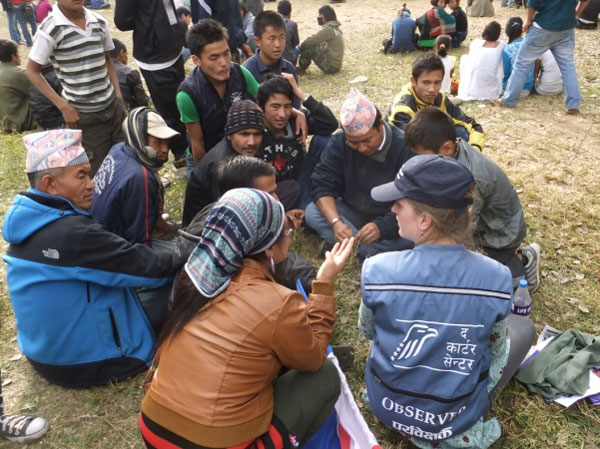By Ben Dunant, Carter Center election observer, Nepal.
Since 2009, The Carter Center has monitored and reported on topics related to Nepal’s peace process. The Center’s long-term observers often travel to remote communities to gain an understanding of citizen perspectives, and they are currently reporting on local governance issues.

We sat within walls of mud and thatch that warped gently into corners that flaked at the seams, cross-legged on thick carpets with woven Tibetan patterns. Our hosts in the village of Sikles presented us with local food that arrived in portion after portion, all accompanied by steamy hot glasses of raksi, the milky-colored spirit distilled from harvested millet.
A representative of one of Nepal’s major political parties sat with us. The best educated and most energetic of all the village’s sons, in the absence of any elected local leaders he had become the acknowledged leader of the community. The man was the first port of call for any grievances or disputes among the people of Sikles. His verdict was considered final and he was someone – in contrast to a reduced, overburdened local administration – who could get things done for people.
Nepal last held comprehensive local elections in 1997, and the terms of the last elected local bodies expired in 2002. The ensuing decade-long vacuum has had troubling implications for responsive, inclusive governance at the local level. It has resulted in local administrators assuming unreasonable workloads and inappropriate duties, and the creation of informal governing mechanisms that are prone to instability.

Based in Nepal’s Western region, the team of Rokey Suleman (third from left), Ben Dunant (white shirt), and Shekhar Parajuli (far right) talk with Nepalis as part of their long-term observation efforts. (All photos: The Carter Center)
We are focusing our current observation efforts toward a Carter Center report on local governance, studying how popular participation and representation has been ensured in the absence of electoral safeguards.
The phenomenon in Sikles — of an influential local stakeholder assuming the duties conventionally taken by elected bodies, and on the basis of social, rather than official, authority — was a telling example of how one close-knit community responded to an ongoing situation of wider national uncertainty.

In Midwestern Region, a Carter Center observer shares a copy of the Center’s latest report. The Center has monitored and reported on topics related to Nepal’s peace process since 2009.
Since October, I have had the privilege of traveling the beautiful Western region with my international and Nepali teammates, talking to people like those we met in Sikles. Days of arduous travel in rough weather and over rougher terrain are compensated every time by the affectionate welcome of the Nepali people. Whatever their political persuasion or personal circumstance, stakeholders and citizens alike appreciate our long-term commitment to aiding durable peace and inclusive democracy.
While The Carter Center meets and notes the concerns of stakeholders at all levels, its pioneering work in Nepal is rooted in these intimate encounters. Few international organizations can claim to see the country like we do.

Carter Center observer Lena Michaels talks with Nepalis in the Eastern Region. The Center’s long-term observers often travel to remote communities to gain an understanding of citizens’ perspectives.
In the face of ongoing divisions in post-conflict Nepal, we draw our optimism for its future from this warm affirmation of our shared relationship — a relationship that we intend to sustain and build upon.
Related Resources
Please sign up below for important news about the work of The Carter Center and special event invitations.